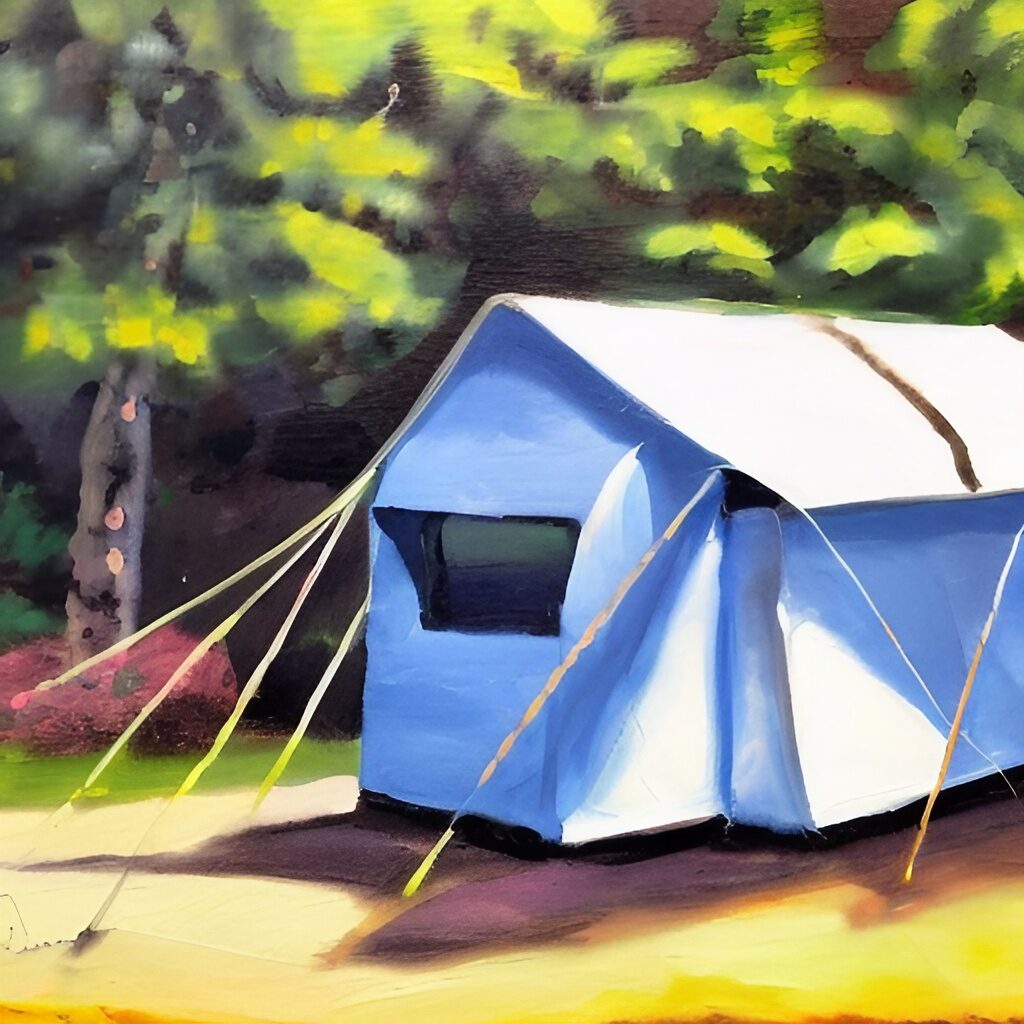
In my experience, canvas and nylon tents have many differences: breathability, weight, and cost come to mind. However, the biggest difference between them is their durability.
In this article, we will explore canvas tents vs nylon tents in-depth.
Canvas tents are more durable than nylon tents. Although they require a bigger upfront investment, they will save you money in the long run. Canvas tents are worth the money if you’re a seasoned, frequent camper and don’t mind the bulk or upfront cost. However, they are not for campers who prefer lightweight tents with quick assembly due to their bulk and weight.
- What Is a Canvas Tent, and How Do They Differ From Nylon Tents? – Canvas Tents vs Nylon Tents
- The Advantages of Canvas Tents – Canvas Tents vs Nylon Tents
- Pro #1: Better Sun Protection – The Advantages of Canvas Tents vs Nylon Tents
- Pro #2: Retain Heat Better In Cold Weather – The Advantages of Canvas Tents vs Nylon Tents
- Pro #3: Easier to Stay Cool – The Advantages of Canvas Tents vs Nylon Tents
- Pro #4: Last For Longer – The Advantages of Canvas Tents vs Nylon Tents
- Pro #5: More Breathable – The Advantages of Canvas Tents vs Nylon Tents
- Pro #6: Material Is More Sustainable – The Advantages of Canvas Tents vs Nylon Tents
- Pro #7: Can be Repaired More Easily – The Advantages of Canvas Tents vs Nylon Tents
- Pro #8: Perfect For Glamping – The Advantages of Canvas Tents vs Nylon Tents
- The Disadvantages of Canvas Tents – Canvas Tents vs Nylon Tents
- Con #1: More Expensive – The Disadvantages of Canvas Tents vs Nylon Tents
- Con #2: Extremely Heavy – The Disadvantages of Canvas Tents vs Nylon Tents
- Con #3: Longer Setup Times – The Disadvantages of Canvas Tents vs Nylon Tents
- Con #4: Rot Easier Than Nylon Tents – The Disadvantages of Canvas Tents vs Nylon Tents
- Con #5: Harder To Dry – The Disadvantages of Canvas Tents vs Nylon Tents
- Con #6: Not Great For Older or Physically Challenged Campers Who Camp Alone – The Disadvantages of Canvas Tents vs Nylon Tents
- When Are Canvas Tents Worth It? – Canvas Tents vs Nylon Tents
- Reasons To Choose Nylon Tents over Canvas – Canvas Tents vs Nylon Tents
- Conclusion – Canvas Tents vs Nylon Tents
- Frequently Asked Questions – Canvas Tents vs Nylon Tents
- 1. What Are The Main Differences Between Canvas and Nylon Tents? – FAQs
- 2. Which is More Durable, Canvas or Nylon Tents? – FAQs
- 3. Is There a Benefit to Using a Canvas Tent Over a Nylon Tent? – FAQs
- 4. What Factors Should I Consider When Deciding Between Canvas and Nylon Tents? – FAQs
- 5. How Do These Tents Fare in Different Weather Conditions? – FAQs
- 6. Is it More Difficult to Set Up Canvas Tents Than Nylon Tents? – FAQs
- 7. Do Canvas and Nylon Tents Require Different Amounts of Upkeep? – FAQs
What Is a Canvas Tent, and How Do They Differ From Nylon Tents? – Canvas Tents vs Nylon Tents
Canvas tents are made of a cotton canvas material that is thicker, heavier, and more durable than nylon and similar materials.
Some canvas tents also contain synthetic materials for added protection against rot, but the points I’ll discuss apply to both cotton canvas and synthetic canvas tents.
Either way, canvas tents have excellent longevity and great temperature regulation, which makes them fantastic for glamping and long trips.
However, canvas tents are also heavy and difficult to assemble, so there are some downsides to them, too. Nylon tents are typically lightweight with easy, quick assembly. So, there’s a light and a dark side to choosing a canvas tent.
The Advantages of Canvas Tents – Canvas Tents vs Nylon Tents
Pro #1: Better Sun Protection – The Advantages of Canvas Tents vs Nylon Tents
Canvas is thicker than nylon. This prevents the sun from getting through to the interior.
You can get sunburned inside a nylon tent, but that will never happen in a canvas one.
It’s not just the sun’s harmful UV rays that you’re protected from, though. You also have more protection against light, so if you like to sleep late in the mornings, it’ll stay darker for longer in your tent. In nylon tents, it’s easy to be roused too early by the glaring sun.
Lastly, nylon tents often take a lot of sun damage despite their UV protective coating. Thinner fabrics are more susceptible to sun damage by default. Your tent’s UV and waterproof coating keep the fabric safe for a little longer, but the UV rays eventually wear the coatings away.
Canvas tents develop less sun damage than nylon tents due to their thicker fabric, so they last longer, even with prolonged summer use.
Pro #2: Retain Heat Better In Cold Weather – The Advantages of Canvas Tents vs Nylon Tents
Despite letting less sun in, canvas tents can retain heat very well. The thick material works as insulation, making the tents highly suitable for cold camping; check out this camper’s picture below.
Don’t get me wrong, nylon tents can retain heat well for their lightweight construction, but they’re nowhere near as suitable for cold-weather camping as canvas tents are. You’ll need lots of blankets and a tent heater for cold weather camping in a nylon tent.
Using a canvas tent in warmer weather may seem like a bad idea based on all this fantastic insulation, as it’s easy to assume that it will get far too stuffy inside the tent. This is sometimes true, but it brings me to my next point.
Pro #3: Easier to Stay Cool – The Advantages of Canvas Tents vs Nylon Tents
The thick material doesn’t only keep heat in, but it keeps heat out, too.
Your tent will eventually heat up to match the temperature outdoors, but you have a little while longer in the morning to enjoy a cool tent interior before things get too hot.
The insulation will also keep cool air in if you manually cool your tent.
If you open the tent windows for a little ventilation and run some cooling fans, you can circulate the air and bring the temperature down. Then you can seal the tent, and the cool air will stay inside your tent for longer.
You won’t find this in nylon tents, as they heat up quickly and can be a nightmare to try and cool down. Cold-weather recommends canvas tents for temperature regulation, but as the camper mentions, there are some trade-offs.
For frequent cold-weather campers, this pro of canvas tents is most definitely worth the investment.
Pro #4: Last For Longer – The Advantages of Canvas Tents vs Nylon Tents
Canvas tents are known for their longevity. They’re highly durable and can withstand wind storms, and I’ve already discussed how they can handle sun exposure.
A well-cared-for canvas tent can last you for a decade or more.
You’ll have to put the work in, of course, and you’ll need to waterproof and season your canvas tent regularly. This isn’t a big ask for a tent that could last more than a decade.
Nylon tents by comparison, last, on average, five years before you need to replace them. Over time, especially for an avid camper, this will get costly.
Pro #5: More Breathable – The Advantages of Canvas Tents vs Nylon Tents
Nylon tents aren’t great at letting air circulate. Even if you have the vents open, you’ll likely have condensation.
Canvas tents are far more breathable, especially pure cotton canvas tents. This lessens the chances of condensation building up in your tent.
Less condensation in your tent means your tent won’t be unpleasantly damp inside. Plus, less damp inside means you’re less likely to have a problem with mold. Mold thrives in damp, dark areas.
However, if you ever have a mold issue, you can read about how to clean a tent with mold and mildew in 4 simple steps.
If condensation builds upon your tent, then it’s not likely to run down the walls and pool on the floor. Canvas absorbs moisture, so you hardly even notice any condensation buildup.
Pro #6: Material Is More Sustainable – The Advantages of Canvas Tents vs Nylon Tents
Canvas, particularly cotton canvas, is biodegradable. It decomposes a few months after you dispose of it, making it eco-friendly. Cotton canvas tents are also made from renewable materials and are environmentally sustainable.
This differs from synthetic nylon and polyester materials, as those are derived from petroleum. Petroleum isn’t renewable, and those materials aren’t biodegradable. Nylon takes around 40 to years to decompose, and polyester can take over 500.
However, the sustainability aspect doesn’t apply to all canvas tents. Some have synthetic blends in them to help protect them against rot. Be sure to read about your tent carefully before selecting if being eco-friendly is important to you.
Pro #7: Can be Repaired More Easily – The Advantages of Canvas Tents vs Nylon Tents
You can often repair nylon and polyester tents, but synthetic materials reach their breaking point much faster than canvas. Eventually, repairing the damage in the synthetic tents will become impossible.
It’s best to repair small rips with gaffer tape, as nylon frays easily and sewing it could make the rip larger. Larger tears can be sewn with fishing lines or cotton, but you must be incredibly careful.
Too many tape-covered or sewn-up spots in the thin nylon weaken the tent, though, and the sewn-up rips are susceptible to reopening.
However, canvas tents can sustain more repairs, properly repaired rips will stay sealed for years, and you can fix larger areas of damage.
For example, if an entire section of your tent is damaged beyond repair, then you can cut the section away and have some fresh canvas sewn in. Waterproof and seam seal it, and you’re good to go. This camper has some advice on that.
Repairing canvas tents can be costly because of the high-quality materials involved. However, you’ll have to repair your tent less often than you’d have to repair a nylon one, thanks to the enhanced durability of canvas tents.
Pro #8: Perfect For Glamping – The Advantages of Canvas Tents vs Nylon Tents
If you’d like to take a more luxurious trip once in a while, then a canvas tent is exactly what you need. Many campers have had great experiences doing this, as mentioned by this camper below.
Canvas tents are perfect for holding furniture, rugs, and other fancy items you want to bring on your glamping trip. Canvas tents are large and durable enough to handle these items.
If you want to keep your tent up year-round, they can even hold semi-permanent flooring, like wood. You can make a canvas tent into a glamorous home away from home, but you can’t do that with a nylon tent.
The Disadvantages of Canvas Tents – Canvas Tents vs Nylon Tents
Con #1: More Expensive – The Disadvantages of Canvas Tents vs Nylon Tents
Canvas tents are always pricier than nylon tents. For example, let’s look for an inexpensive canvas tent vs an inexpensive nylon tent.
The Free Space Outdoor Canvas Pyramid-Shaped Tent fits two people and comes in at $150 – $250, and it’s currently one of the most affordable canvas tents on Amazon. A 2-person Coleman Sundome tent is less than $80.
Now we can jump up to pricier tents.
This Danchel Outdoor Cotton Canvas Yurt Tent is an extremely high-quality 13-foot tent great for glamping and extended camping trips. It costs more than $700. This Ozark Trail 16 by 16-foot tent is less than $500.
However, tents vary in quality, and sometimes you may come across a pricey canvas tent that’s not worth the additional expense vs a nylon one. That’s something you’ll have to look out for, too. You want to ensure that your tent is worth the additional expense.
Ensure it has:
- Steel or iron poles.
- Sturdy pegs.
- Thick guylines.
- A waterproof floor.
- High-quality, thick canvas.
Con #2: Extremely Heavy – The Disadvantages of Canvas Tents vs Nylon Tents
There are a few large nylon tents comparable to canvas tents weight-wise, but you can see an extreme difference in the two smaller tents discussed above. The 2-person canvas tent mentioned earlier weighs 7.75 pounds, and the 2-person canvas tent weighs 21 pounds.
Canvas tents can often exceed 50 or 60 pounds in weight, too. The larger canvas tent from above weighs over 60, which is 20 pounds more than this similarly-sized CORE 12-person polyester tent.
The heavy weight of even the smallest canvas tents makes these unsuitable for backpackers and not great for shorter camping trips. Is it worth carrying something so heavy only to leave it up for a few days then bring it home again?
Con #3: Longer Setup Times – The Disadvantages of Canvas Tents vs Nylon Tents
Many nylon tents are instant tents. You extend the pre-assembled poles, stake the tent out, and finish in about 5 minutes. Of course, some models require more extensive setups, but many great ones are “instant”.
Some canvas tents can be set up fast. For example, this camper had a positive experience setting up the Kodiak Canvas Flex-Bow Canvas Tent Deluxe.
Unfortunately, not everyone has such a positive experience with canvas tents. The weight and bulk of the canvas can add time and difficulty to the setup, as this camper states.
Here’s another camper who had a hard time.
Lastly, the weight and bulk of canvas tents often require 2-3 people to set them up, but many nylon tents can be set up by one person.
Con #4: Rot Easier Than Nylon Tents – The Disadvantages of Canvas Tents vs Nylon Tents
Your nylon tent can easily develop mold or mildew, but it’s highly unlikely to rot because of it. This isn’t the case with natural materials like canvas. Caring for your tent will help keep rot at bay.
You’ll need to be far more cautious about ensuring the entire tent is dry before packing and storing it, and you’ll want to clean up any patches of mold or mildew ASAP.
And if you live in a humid climate, you’ll want to dry your tent in the shade, but finding a sheltered indoor space to dry it is best.
Rot spreads quickly, weakening the fabric to the point that it turns to dust. If it spreads too far, you may have to replace large sections of your tent.
Con #5: Harder To Dry – The Disadvantages of Canvas Tents vs Nylon Tents
Canvas shrinks when wet, so peg your tent out for it to retain shape as it dries.
For best results, let your tent dry out while it’s fully assembled. This will make sure it stays in the correct shape and size.
You don’t have to do this with nylon tents. You can hang a nylon tent up in any position and be confident that the fabric won’t shrink. Because of this, drying a canvas tent is a little more inconvenient than drying a nylon one.
This camper shares a few tips on drying your canvas tent.
Con #6: Not Great For Older or Physically Challenged Campers Who Camp Alone – The Disadvantages of Canvas Tents vs Nylon Tents
Perhaps you’re a retiree or don’t work, so you go camping often. Because of that, you want a long-lasting tent—unfortunately, canvas tents won’t work well for you.
On one hand, canvas tents are great for physically challenged people, as you don’t have to step over a piece of fabric to walk through the door. Unfortunately, the convenience stops there.
Unless you’re traveling with a strong and fully able-bodied person who can help you, you likely won’t be able to set up your tent alone. They’re too heavy and bulky to get set up without help if you’re not in peak physical condition.
Not to mention the physical labor involved in loading your tent into your car, carrying it to the campsite, and packing it.
When Are Canvas Tents Worth It? – Canvas Tents vs Nylon Tents
Canvas tents are worth it if you value longevity and saving money in the long run, provided you don’t need to carry the tent by hand over long distances. If you backpack or take short, infrequent trips, a canvas tent may not be best for you.
You should choose canvas, and it’d be worth it if:
- You camp exclusively in cold weather: The additional insulation will be beneficial.
- Hiking and backpacking aren’t for you: You don’t need your tent to be quite so light.
- You like long stays: You won’t have to disassemble a bulky and heavy tent after only a few days.
- You’re an experienced camper: You’re ready to upgrade to a canvas tent and camp often enough to warrant the purchase.
- You camp multiple times per year: If you camp more often than most people, then you’ll want to tent that’s wonderfully durable, like a canvas tent.
If you’re interested in getting a canvas tent, you may want to check out the best canvas tents on the market. They come in sizes that fit one person right up to 10.
Reasons To Choose Nylon Tents over Canvas – Canvas Tents vs Nylon Tents
You should choose nylon tents if:
- You love hiking and backpacking: You need a lightweight tent for this.
- You’re not very strong: You need a light enough tent to set up easily.
- You prefer short stays: Nylon tents are easier to put up and take down if you only stay somewhere for a night or two.
- You don’t have much to invest upfront: There is no need to go out of your way to purchase something if you can’t comfortably afford it.
- You’re a beginner: Wait until you’re sure camping will be a regular hobby.
- You won’t camp often enough: You may not camp often enough to warrant the purchase.
- You camp exclusively in warm weather: You won’t need the extra insulation to keep heat in.

Conclusion – Canvas Tents vs Nylon Tents
There’s no wrong choice here: canvas and nylon have pros and cons.
Canvas tents are long-lasting, durable, and great at regulating temperature. However, they’re much heavier and bulkier than nylon tents and pricier too, so they’re not for everyone.
Either tent can work well for you, so evaluate your needs and priorities and choose based on that. The information above should help you make your decision.
Shop around until you find a tent that you like. I’m sure you’ll find something suitable for you, canvas or nylon.
Frequently Asked Questions – Canvas Tents vs Nylon Tents
1. What Are The Main Differences Between Canvas and Nylon Tents? – FAQs
The primary distinction between canvas and nylon tents is the material used to construct them. Canvas tents are typically made of cotton or a cotton/polyester blend, whereas nylon tents are made of synthetic materials such as polyester or nylon.
2. Which is More Durable, Canvas or Nylon Tents? – FAQs
Canvas tents are more durable than nylon tents because they rip and tear less easily. On the other hand, they can be treated with a waterproof coating to make them more resistant to water damage.
3. Is There a Benefit to Using a Canvas Tent Over a Nylon Tent? – FAQs
In hot weather, better ventilation and cooler temperatures inside the tent are two advantages of using a canvas tent. Canvas is also a more natural material that is less likely to irritate the skin of allergy sufferers.
4. What Factors Should I Consider When Deciding Between Canvas and Nylon Tents? – FAQs
It’s critical to consider your intended use when deciding between canvas and nylon tents. For example, a canvas tent may be a better choice when camping in hot weather because it will be cooler inside. If you intend to camp in a rainy area, a nylon tent may be a better choice because it will be more resistant to water damage.
5. How Do These Tents Fare in Different Weather Conditions? – FAQs
In most weather conditions, canvas and nylon tents can provide adequate shelter. On the other hand, nylon tents perform better in extreme conditions such as high winds or heavy rains because they are less likely to tear or blow away.
6. Is it More Difficult to Set Up Canvas Tents Than Nylon Tents? – FAQs
Canvas tents can be more difficult to set up than nylon tents because they are often larger and heavier. However, once you’ve mastered erecting a canvas tent, it shouldn’t take much longer than erecting a nylon tent.
7. Do Canvas and Nylon Tents Require Different Amounts of Upkeep? – FAQs
Canvas and nylon tents require some level of upkeep to stay in good condition. For example, both types of tents should be cleaned on a regular basis and stored in a dry location when not in use.














